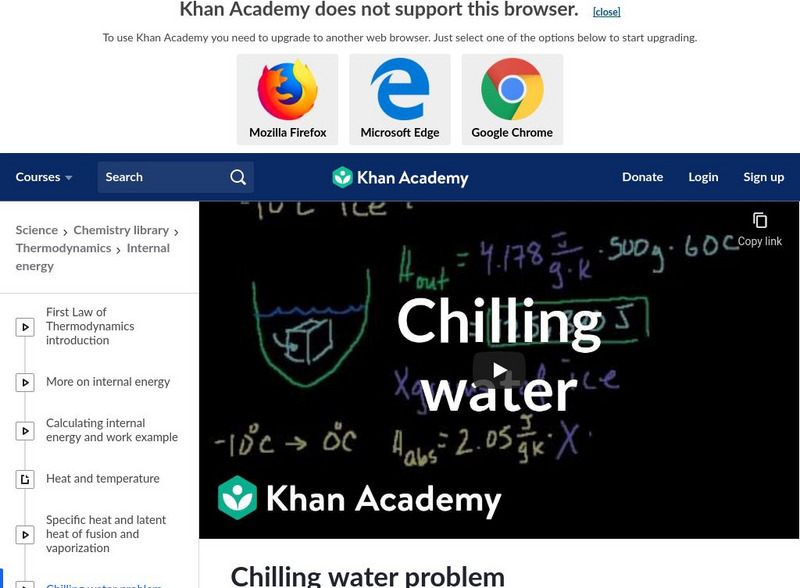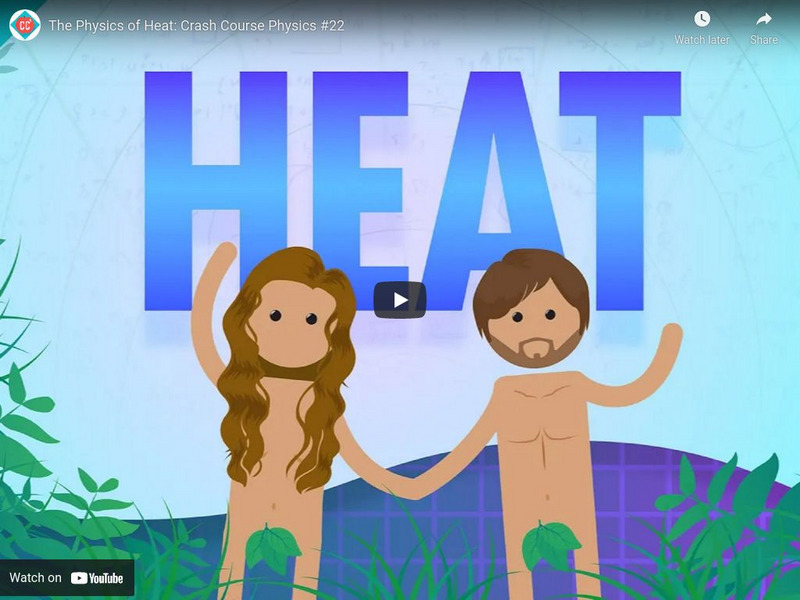TED-Ed
TED-Ed: Under the hood: The chemistry of cars - Cynthia Chubbuck
There are over one billion cars in the world right now, getting people from point A to point B. But cars aren't just a mode of transportation; they also teach an excellent lesson in chemistry. Cynthia Chubbuck navigates the intricate...
Bozeman Science
Water: A Polar Molecule
In this video Paul Andersen explains how the polarity of water makes life on the planet possible. Oxygen is highly electronegative and pulls the electrons closely creating a partial negative charge. The polarity of water (and the...
Bozeman Science
Calorimetry
In this video Paul Andersen describes the history of calorimetry and explains how it can be used to measure energy changes in a system. The specific heat of water is well established and so as a system releases or absorbs energy from a...
Crash Course
The Physics of Heat: Crash Course Physics
Have you ever wondered why we wear clothes? I mean, beyond the obvious. Why does wearing a jacket in the cold keep your warmer? What is happening to all the heat inside your body? In this episode of Crash Course Physics, Shini talks...
Curated Video
Molar Heat CapacityExplained in Simple Words
Heat capacity is defined as the amount of heat energy required to raise the temperature of a given mass of a substance by one unit. Specific heat capacity and molar heat capacity are properties derived from the heat capacity of a...
ATHS Engineering
Thermodynamics: Clarifying Common Misconceptions and Calculating Final Temperature
In this video, the teacher addresses a mistake made in a previous video on thermodynamics and clarifies the concept of energy conservation in closed thermodynamic systems. They provide examples and equations to show how to properly set...
msvgo
Water
This explains structure and properties of water including hardness of water and methods of removing the hardness.
Catalyst University
General Chemistry | Heat Capacity (q=smΔT) [Example 2]
Here, we perform a sample calculation for heat capacity in which we solve for a temperature (T) using q=smΔT.
Catalyst University
General Chemistry | Enthalpy of Reaction (ΔH_rxn) [Example 1]
Here is one example in which we calculate enthalpy of reaction (ΔH_rxn).
ATHS Engineering
Thermodynamics: Thermal Equilibrium Calculations
This is explains how to calculate energy changes when two substances are in thermal equilibrium and one system does work on the other. The teacher provides examples and walks through the calculations step-by-step, preparing students for...
Professor Dave Explains
Practice Problem: Calorimetry and Specific Heat
In calorimetry experiments we measure heat transfer. Say we take a hot piece of metal and put it in some cold water, and measure the rise in temperature of the water as the system equilibrates. Can you use this information to calculate...
Catalyst University
General Chemistry | Heat Capacity (q=smΔT) [Example 1]
Here, we perform a sample calculation for heat capacity in which we solve for heat (q) using q=smΔT.
ATHS Engineering
Understanding the Heat Transfer Equation in Thermodynamics
This video explains the heat transfer equation, Q equals MC delta T, which helps us understand the math behind thermodynamics. It breaks down the meaning of each variable in the equation and provides an example of how to use it to...
Mazz Media
Specific Heat Capacity and Heat Capacity
This video defines the difference between heat capcity and specific heat capacity. In this program students will learn why different substances heat up and cool down at different rates and come to understand how specific heat capacity of...
Professor Dave Explains
Heat Capacity, Specific Heat, and Calorimetry
We can use coffee cups to do simple experiments to figure out how quickly different materials heat up and cool down. Take a look!
Khan Academy
Chilling Water Problem, States of Matter and Intermolecular Forces, Chemistry
Sal continues this short series on specific heat and vaporization. The situation he poses uses 500 grams of liquid water at 60 degrees Celsius to get the water to zero degrees Celsius. The ice he adds to the water comes out at -10...
Amoeba Sisters
Properties of Water
Being essential for life is only one of water's many amazing properties! Why is water so versatile? Biology scholars discover the myriad of uses for water and the properties that make them possible. Content includes density, surface...
Bozeman Science
Water - A Polar Molecule
Details why the polarity of water is so important to life with a video that explains how polarity impacts cohesion, adhesion, capillary action, high specific heat, and solvents.
DoodleScience
U-Values and Specific Heat Capacity
If you want to keep warm, learn how chemistry can help you choose materials when building a house. The video informs pupils how to interpret a u-value in relation to a given material. In addition, the instructor explains specific heat...
Khan Academy
Khan Academy: Chilling Water Problem
An example of how ice can cause energy to transfer and reduce the temperature of water. [11:23]
University of Florida
Chemistry 2041 Lecture Notes: Phases and Equilibrium
An extensive set of notes and graphics (excellent graphics) pertaining to the phases of matter, phase changes and the energy changes associated with changes in phase. Characteristic properties of solids, liquids and gases are discussed....
Sophia Learning
Sophia: Define Specific Heat
This lesson will define specific heat of a substance and provide examples, using units of calories and joules.
Sophia Learning
Sophia: Enthalpy Calculation
This lesson will provide an example of calculating the total amount of energy required for water to change from a solid at a temperature below zero celsius to a gas at a temperature above 100 degrees. A labeled phase change diagram will...
Crash Course
Crash Course Physics #22: The Physics of Heat
Have you ever wondered why we wear clothes? I mean, beyond the obvious. Why does wearing a jacket in the cold keep your warmer? What is happening to all the heat inside your body? In this video episode of Crash Course Physics, Shini...









